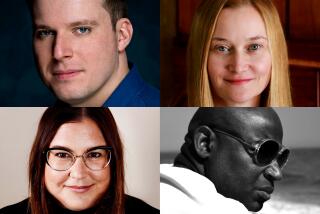Among many secret worlds
- Share via
Several years ago, University of Aberdeen comparative literature professor Jane Stevenson embarked on an ambitious plan: to write a trio of historical novels that would illuminate life in Europe and the New World. The first, “The Winter Queen,” concerned the 17th century secret love affair and marriage between the Queen Elizabeth of Bohemia -- the sister of England’s Charles I and daughter of James I -- and Pelagius van Overmeer, a captured prince of the Oyo people of West Africa.
“The Winter Queen,” brimming with royal intrigue, fascinating details of life in not only Holland but also West Africa and a startling yet compelling love story, garnered rave reviews and whetted readers’ appetite for more of the same. The second installment, “The Shadow King,” centers on Balthasar van Overmeer, secretly born to Queen Elizabeth at the first novel’s end and now attending medical school in Leiden, Holland. Balthasar is painfully aware of the mixture of bloods and heritages he harbors, else they ruin him and those he loves.
Yet he is a young man who also treasures the small fineries and tokens of his “secret life” and finds comfort in medicine, a “magical glass” that allows him to see the “cruel knowledge of the body beneath the clothes, all that people tried to keep secret, and beyond that, the things which were secret even from them: the workings of their inner organs.... It was so easy to know more of people than they knew of themselves, it was saddening.”
While Balthasar treasures his abilities to see inside people’s bodies, he is less adept at probing their minds. He returns to his hometown of Middleburg and establishes his practice among the Dutch middle class. But when he meets Aphra Behn, he’s ill-equipped to detect her true nature, for Behn -- a historical figure considered the first Englishwoman to earn a living from her writing -- is a translator of often-scandalous foreign texts, an aspiring playwright and sometime-spy for England.
About to leave Holland for England, she visits Balthasar’s home to leave one of her translations as a thank-you gift and discovers puzzling portraits of Elizabeth and the infant Balthasar, holding red and white roses symbolizing the House of Stuart. She also finds a locked box with Pelagius’ books on herbs and a few letters between Balthasar’s parents, which she steals.
One hopes this surprising turn of events leads to the kind of intrigue found in the first novel, and, for a while, “The Shadow King” picks up steam. Balthasar, too, immigrates to London, after the plague strikes Middleburg. There he settles into a pious, middle-class Dutch enclave, practicing his profession and building a life of quiet prosperity. He also ventures into the wider city, where he meets Theodore Palaeologue, a dashing young lieutenant with a royal lineage, and attends a play where he is exposed to the “molly” world of gay men, including Endymion Piers, an acquaintance of Behn’s.
Piers has heard the rumors about Balthasar’s royal bloodlines and introduces him to a former disciple of Francis Bacon, who tries to dupe the young physician into investing in a mining venture by conjuring his dead mother. The ruse, at odds with his scientific training, fails, and Balthasar exposes the man’s fraud. The experience leaves him suspicious of the English, “the false faces of smiling harlots, and men who say things in doubled words.... I am not home here and I never will be.”
When Palaeologue presents the notion of immigrating to Barbados, where his family owns a plantation, the newly married Balthasar is eager to listen. “A man’s life is his own,” his friend asserts. “When all is said and done, to be in the shadow of a Caesar -- or of a king of Oyo -- is to be a little more than a poor Christian gentleman, but we are men, and not walking ghosts or the dreams of our ancestors.” Balthasar, whose bride Sibella owns property on the island, decides to strike out for a new beginning.
Stevenson’s depiction of Barbados, its daily hardships, sugar plantations and slavery, is another fascinating chapter in Balthasar’s life. It’s an ironic one too, for Balthasar is constantly alert to the fact that, despite his background and white wife, he is a “negro,” considered by some no better than a slave. He resolves to live in the grandest manner he can, down to wearing a coat and wig in the sweltering heat and owning slaves, to prevent a life-threatening case of mistaken identity.
Thus protected, a period of calm and prosperity ensues for Balthasar, as he cures the governor of the island and learns folk remedies from slave healers. But Balthasar is no more at home on Barbados than he was in England. His return to England and adoption of the Stuart surname feel almost anticlimactic, although some tantalizing loose ends hint at new drama to come.
A host of skillfully blended historical and fictional events makes “The Shadow King” an intellectually stimulating read, but, as seen through the eyes of Balthasar -- a man of science who finds little sense of belonging among Europeans or Africans in the New World -- the novel becomes more thought-provoking than thrilling, more observed than felt. Still, like most middle entries in trilogies, there’s enough here to cause readers to withhold final judgment. One only hopes the story of the third generation of the complex Van Overmeer-Stuart family, due out later this year, restores this saga to the emotional and intellectual brilliance achieved in the first installment. *
More to Read
Sign up for our Book Club newsletter
Get the latest news, events and more from the Los Angeles Times Book Club, and help us get L.A. reading and talking.
You may occasionally receive promotional content from the Los Angeles Times.










